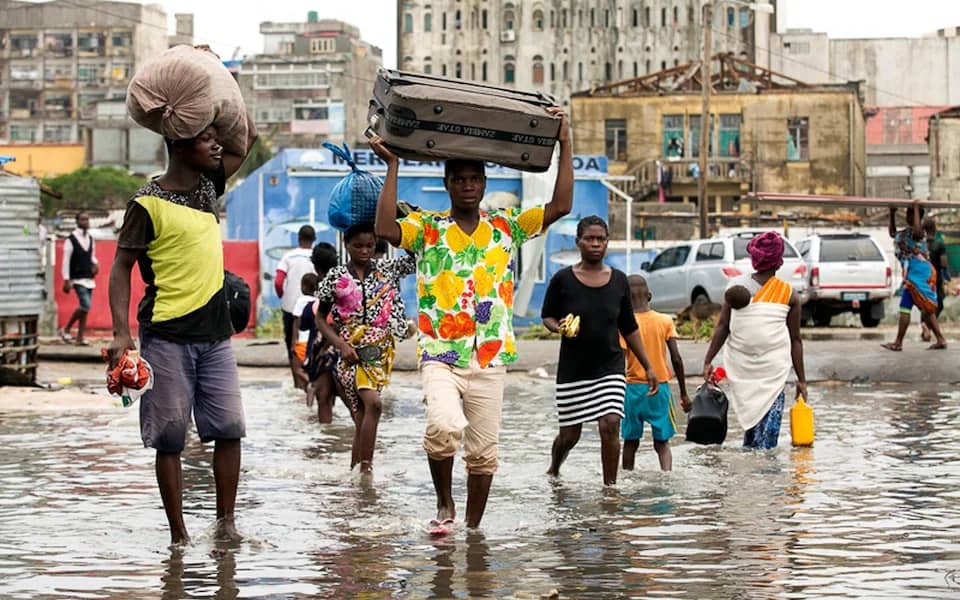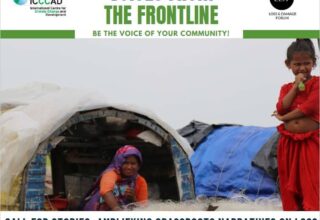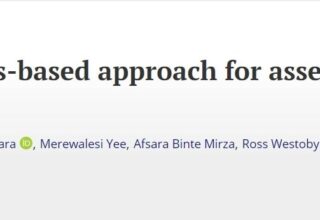
People in developing countries have been bearing the brunt of climate change for decades. But it has taken wildfires in Greece, flooding in Germany and Belgium and a heatwave and hurricanes in the US for the rich world to really sit up and take notice.
The challenge now is ensuring that world leaders listen to what is being said in low-income countries and for wealthier countries to pay their fair share for the loss and damage their carbon emissions have caused.
The first step is for them to finally deliver on a promise made 12 years ago to provide increased funding to developing countries to help them combat climate change.
At the Copenhagen UN climate meeting in 2009, high income countries including the UK, US and Germany, set themselves a target to increase the amount of money they give to developing countries to $100bn a year by 2020.
The money is intended to help developing countries reduce greenhouse emissions and adapt to the impacts of climate change, for example by investing in climate-resilient infrastructure such as water supplies, roads and bridges.
The latest figures from the OECD in September showed that richer nations delivered only $79bn in 2019, the latest year for which figures are available.
What’s more, only around 25 per cent of the money goes towards helping communities adapt to the climate impacts they are already experiencing. The majority is spent on mitigating future impacts.
The climate finance delivery plan published this week by Germany and Canada suggests the $100bn target will not now be met until 2023.
If rich countries don’t pay up, the risk is that developing countries pull the plug on the Cop26 climate change talks entirely.
A fundamental issue of trust
It is a fundamental issue of trust. Why would developing countries want to come to the table in Glasgow next week when they already feel richer nations’ promises are just empty words?
While it was encouraging to hear Boris Johnson urge world leaders at the UN in September to commit to ambitious climate change pledges before Cop26, unless these words are backed by urgent action it will be a case of too little, too late.
Mr Johnson has welcomed a commitment from President Joe Biden to double US climate finance, as the UK is doing, over the next few years but what is crucial is that they now work together to convince G20 members yet to show their hand to do the same.
The UK and its partners – which are due to meet at the G20 in Rome at the weekend – need to show real leadership and immediately deliver on their $100bn a year climate funding pledge in full.
For Mr Johnson, failure to do this against a background of aid cuts (regardless of the fact that they may now be reversed in three years’ time) makes it harder to persuade other countries to step up and it could derail the talks completely.
But delivering on a decade-old pledge is only the first step towards a successful Cop. Even if it is delivered – and it’s a big if – the reality is that public finance alone won’t be enough. As Mark Carney, the Prime Minister’s Cop adviser said, the scale of that helps needs to be ramped up a thousand-fold, to $100trn.
What is also key to meeting the Cop presidency’s objectives is harnessing finance from governments to encourage larger flows of private finance.
Cross-sector collaboration essential
In order to achieve this, developing country governments need to work with their citizens, international partners and the private sector to ensure the regulatory environment and investment conditions are right and that there is also cross-sector collaboration.
These are essential ingredients for de-risking climate and development programmes that are locally led, scalable and which serve the poorest communities.
One such example is The Resilient Water Accelerator. Launched by the Prince of Wales’s Sustainable Markets Initiative, it aims to bring together governments, businesses, and NGOs to provide 50 million people in water-stressed communities with reliable and sustainable water sources by 2030.
Its model brings local communities together to improve data on the impact climate change has on water-related disasters; encourages more effective water use across agriculture, energy, industry and households and makes it easier to invest in programmes in parts of Africa and Asia that might not otherwise easily attract finance.
The climate crisis is a water crisis at its core, as the impacts of climate change are often experienced through water.
More intense and more frequent floods pollute water sources and destroy crops or homes, while longer and more frequent droughts dry up the springs many people need to survive.
Millions more will struggle to grow food and maintain livestock, and it will be harder to stay healthy or even survive unless clean water and good sanitation and hygiene are prioritised.
There are also sound economic reasons, as recent research by Vivid Economics and WaterAid found. Every US dollar spent on strategic flood resilience upgrades can save US$62 in flood restoration costs.
We know what can be achieved through the kind of global collaboration and innovation seen in the rapid development of coronavirus vaccines. Tackling climate change is, in some ways, more straightforward. We know what the solutions are, we just need the political will to deliver them.
Mr Johnson needs to show Britain at its diplomatic best ahead of Glasgow in order to secure vital climate finance and convince countries such as China and Australia to take action on carbon emissions.
Failure to do so could affect the lives millions of people across the globe. It’s a matter of climate justice and the success of Cop26 depends on it.
Originally this article was published on October 29, 2021 at The Telegraph.
The author Prof. Saleemul Huq is the director of the International Centre for Climate Change and Development (ICCCAD) at the Independent University, Bangladesh (IUB).
Email: saleemul.huq@icccad.org






